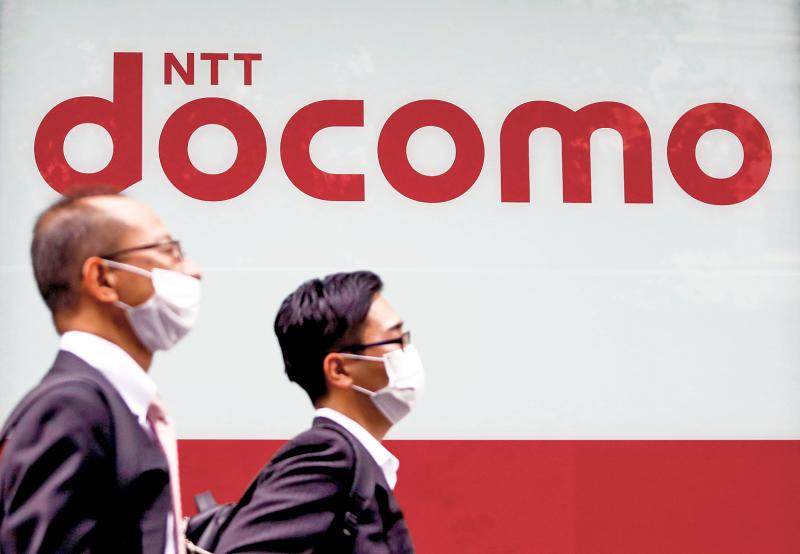Nippon Telegraph & Telephone Corp (NTT) plans to turn its wireless carrier unit NTT Docomo Inc into a wholly owned subsidiary, a move that might help Japanese Prime Minister Yoshihide Suga’s policy push for lower phone tariffs.
NTT would pay ¥3,900 a share to acquire the shares it does not already hold, the companies said in a statement.
The buyout is worth about ¥4.25 trillion (US$40.3 billion), a more than 40 percent premium to Monday’s closing price in Tokyo. Given that parent NTT already controls 66 percent of the wireless carrier, any proposal is all but guaranteed to pass.

Photo: Reuters
Docomo’s board said that it is in favor of the takeover by its parent, which would fund the purchase through borrowings.
The tender offer, the largest for a Japanese company in history, is scheduled to start today and would be completed in the fiscal year ending March 31. When NTT spun out Docomo in 1998, it was also the biggest recorded initial public offering at the time.
The proposal to combine the former national companies comes just 15 days after Suga succeeded former Japanese prime minister Shinzo Abe.
With government documents showing data-heavy users in Tokyo pay more than three times for a monthly contract than users in Paris, Suga has made reducing phone bills charged by Docomo and Japan’s other major carriers a priority to score a quick policy win and avoid being seen as a caretaker leader, market watchers have said.
“In order to solidify his position, he must quickly deliver on some popular economic reforms and has likely already created a battle plan for a few,” Nikko Asset Management Co chief global strategist John Vail wrote in a report.
“Lowering mobile phone costs will be the most popular with voters. Emphasis on the digitalization of the economy and antiquated government services is also likely popular and, thus, next on the list,” Vail said.
Docomo shares, which traded without the right to the next dividend, surged by their 18 percent limit at the close in Tokyo yesterday, having been untraded during market hours with buy orders exceeding offers after the Nikkei reported the plan first.
NTT shares, which yesterday also traded without the right to the next dividend, declined as much as 3.7 percent.
NTT would borrow about ¥4.3 trillion to finance the buyout, it said.
Japanese law requires the government to hold at least one-third of NTT, which would make it difficult for the company to issue new shares to raise funds. The firm had ¥1.09 trillion in cash and equivalents at the end of March.
“The deal would in the short run place a heavy burden on NTT’s finances and likely cap shareholder returns, in particular buybacks,” Citi Research analyst Mitsunobu Tsuruo wrote in a report.
NTT chief executive officer Jun Sawada told reporters in an online news conference that NTT Communications might be moved under Docomo, ruling out any plans to take NTT Data Corp private.

The US dollar was trading at NT$29.7 at 10am today on the Taipei Foreign Exchange, as the New Taiwan dollar gained NT$1.364 from the previous close last week. The NT dollar continued to rise today, after surging 3.07 percent on Friday. After opening at NT$30.91, the NT dollar gained more than NT$1 in just 15 minutes, briefly passing the NT$30 mark. Before the US Department of the Treasury's semi-annual currency report came out, expectations that the NT dollar would keep rising were already building. The NT dollar on Friday closed at NT$31.064, up by NT$0.953 — a 3.07 percent single-day gain. Today,

‘SHORT TERM’: The local currency would likely remain strong in the near term, driven by anticipated US trade pressure, capital inflows and expectations of a US Fed rate cut The US dollar is expected to fall below NT$30 in the near term, as traders anticipate increased pressure from Washington for Taiwan to allow the New Taiwan dollar to appreciate, Cathay United Bank (國泰世華銀行) chief economist Lin Chi-chao (林啟超) said. Following a sharp drop in the greenback against the NT dollar on Friday, Lin told the Central News Agency that the local currency is likely to remain strong in the short term, driven in part by market psychology surrounding anticipated US policy pressure. On Friday, the US dollar fell NT$0.953, or 3.07 percent, closing at NT$31.064 — its lowest level since Jan.

The New Taiwan dollar and Taiwanese stocks surged on signs that trade tensions between the world’s top two economies might start easing and as US tech earnings boosted the outlook of the nation’s semiconductor exports. The NT dollar strengthened as much as 3.8 percent versus the US dollar to 30.815, the biggest intraday gain since January 2011, closing at NT$31.064. The benchmark TAIEX jumped 2.73 percent to outperform the region’s equity gauges. Outlook for global trade improved after China said it is assessing possible trade talks with the US, providing a boost for the nation’s currency and shares. As the NT dollar

The Financial Supervisory Commission (FSC) yesterday met with some of the nation’s largest insurance companies as a skyrocketing New Taiwan dollar piles pressure on their hundreds of billions of dollars in US bond investments. The commission has asked some life insurance firms, among the biggest Asian holders of US debt, to discuss how the rapidly strengthening NT dollar has impacted their operations, people familiar with the matter said. The meeting took place as the NT dollar jumped as much as 5 percent yesterday, its biggest intraday gain in more than three decades. The local currency surged as exporters rushed to